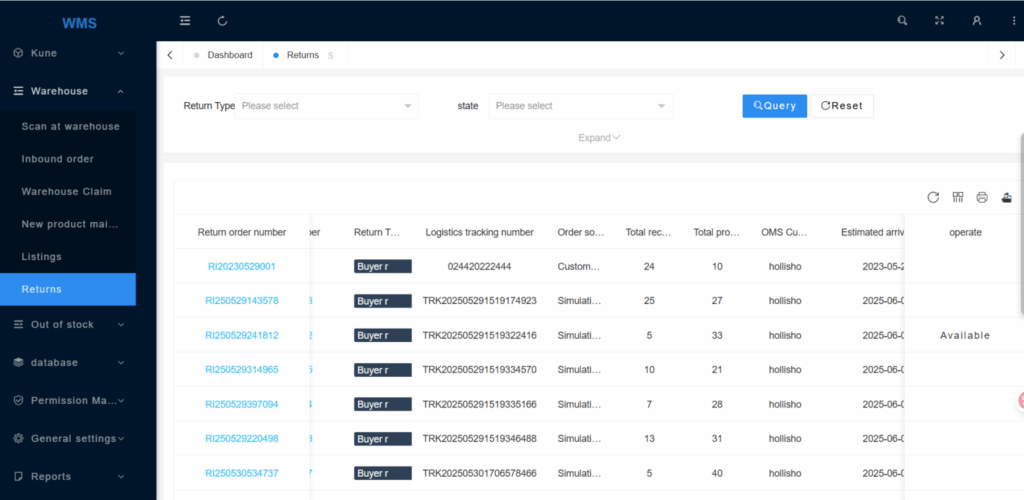Challenges in Reverse Logistics Tracking and How to Overcome Them
Reverse logistics tracking plays a crucial role in the efficient management of returns, repairs, recycling, and product recalls. However, businesses often face several challenges when managing reverse logistics, which can impact customer satisfaction and operational efficiency. This article will highlight the main challenges in reverse logistics tracking and provide actionable solutions, along with how Postalparcel’s services can help businesses streamline this process.

Understanding Reverse Logistics Tracking
Reverse logistics refers to the process of moving products from their final destination back to the manufacturer or seller for returns, repairs, recycling, or disposal. Tracking reverse logistics can be complex, as it involves managing product returns, warranty claims, and maintaining communication with customers.
Effective reverse logistics tracking is crucial for businesses as it directly impacts customer satisfaction, operational efficiency, and costs. However, businesses often struggle with the following common challenges in reverse logistics tracking.
Major Challenges in Reverse Logistics Tracking
1. Lack of Visibility and Transparency
One of the biggest issues with reverse logistics is the lack of real-time visibility into the status of returned products. Without accurate tracking, it’s challenging to determine where a product is in the reverse logistics chain, leading to delays, incorrect inventory management, and poor customer experiences.
Solution:
To address this, businesses can leverage advanced tracking technology that provides real-time updates on the movement of returned products. This ensures visibility at every step of the process and allows businesses to react quickly to any issues.
2. High Operational Costs
Handling returns and managing reverse logistics often come with high operational costs. These costs can be further increased if the process is inefficient or lacks proper automation. Warehousing, transportation, and inspection of returned products can quickly add up.
Solution:
Implementing automated systems for returns processing and improving the efficiency of warehouse management can reduce these costs. Automation can streamline product inspection, sorting, and restocking, saving time and reducing labor costs.

3. Complex Inventory Management
Managing returns efficiently is often complicated by inventory issues. Returned products may need to be inspected, refurbished, and restocked, all while maintaining accurate inventory records. This can lead to overstocking, stockouts, or even losing track of returned products.
Solution:
Using advanced inventory management systems, like those provided by Postalparcel, can improve inventory tracking and help businesses efficiently manage returned goods. Accurate real-time inventory data ensures that products are properly sorted and restocked or returned to the manufacturer.
4. Customer Dissatisfaction
Customers expect an easy, seamless process for returning products. Long wait times, lack of communication, or delayed refunds can result in negative customer experiences and impact brand reputation.
Solution:
Clear communication throughout the return process and fast processing times are essential. Businesses should use reverse logistics tracking solutions that allow customers to receive real-time updates on their returns. This transparency helps build trust and leads to higher satisfaction.
5. Environmental Impact
The environmental impact of reverse logistics is often overlooked. Returns can result in products being sent to landfills, creating unnecessary waste. Additionally, the transportation involved in returns can contribute to carbon emissions.
Solution:
Adopting environmentally-friendly practices in reverse logistics, such as refurbishing and recycling returned products or using sustainable packaging, can help minimize the environmental impact. Businesses can also use reverse logistics tracking to determine the most efficient and sustainable methods for handling returns.

How Postalparcel Can Help Overcome Reverse Logistics Tracking Challenges
1. Carrier Management and Delivery Optimization
Postalparcel offers a comprehensive service for managing logistics, including reverse logistics. The platform provides businesses with the flexibility to choose the best carrier for each return, optimizing shipping costs and delivery times. With Postalparcel’s carrier management service, businesses can streamline the reverse logistics process, ensuring that returns are handled quickly and efficiently.
- Customizable Carrier Options: Choose from a variety of carriers to suit specific business needs.
- Cost Optimization: Postalparcel helps businesses select the most cost-effective delivery options for returns.
- Real-Time Tracking: Monitor returns through the entire reverse logistics journey with live updates.
2. Inventory and Order Management Services
Effective inventory management is critical in reverse logistics, especially when dealing with returns. Postalparcel’s inventory and order management services ensure that businesses can track and manage returned products efficiently.
- Real-Time Inventory Updates: Get up-to-date information on stock levels and product returns.
- Return Processing Efficiency: Quickly process returns and restock items in the inventory to ensure smooth operations.
- Seamless Integration: Postalparcel’s services integrate smoothly with existing systems, reducing errors and improving workflow.
3. Enhanced Customer Experience
Postalparcel’s reverse logistics tracking system provides customers with clear communication regarding the status of their returns. Real-time updates and seamless tracking help improve customer satisfaction, making the return process more transparent and efficient.
- Customer Notifications: Customers are notified of their return status and expected refund dates.
- Faster Processing: Postalparcel’s automation speeds up the return process, ensuring that customers receive their refunds or replacements quickly.

Key Benefits of Effective Reverse Logistics Tracking
1. Cost Efficiency
Implementing a streamlined reverse logistics tracking system can significantly reduce operational costs. By optimizing returns handling, warehousing, and transportation, businesses can lower the overall expenses of reverse logistics.
- Reduced Labor Costs: Automated sorting, processing, and inventory management save time and reduce manual labor.
- Lower Shipping Costs: Efficient carrier management ensures the most cost-effective shipping options for returns.
2. Improved Inventory Control
With real-time tracking and better inventory management systems, businesses can maintain accurate stock levels and reduce overstocking or stockouts caused by returns.
- Accurate Inventory Tracking: Real-time data allows businesses to track returned products efficiently and restock them without delay.
- Better Stock Utilization: Businesses can refurbish and resell returned products, improving overall stock turnover.
3. Enhanced Customer Trust
By providing a seamless, transparent return process, businesses can improve customer trust and loyalty. Customers who can easily return products and receive timely refunds or replacements are more likely to return for future purchases.
- Transparent Process: Real-time updates on the return status help customers feel informed and valued.
- Positive Brand Image: A smooth return experience can boost a brand’s reputation and customer retention.
Conclusion
Reverse logistics tracking can be challenging, but with the right systems in place, businesses can overcome these obstacles. By improving visibility, reducing costs, and enhancing customer satisfaction, businesses can streamline their reverse logistics processes and improve their bottom line. Postalparcel’s comprehensive logistics services, including carrier management, inventory control, and order management, help businesses manage reverse logistics more effectively. With Postalparcel, businesses can ensure that their reverse logistics operations are efficient, cost-effective, and customer-friendly, ultimately leading to a better overall experience for both businesses and their customers.
Industry Insights
news via inbox
Nulla turp dis cursus. Integer liberos euismod pretium faucibua








